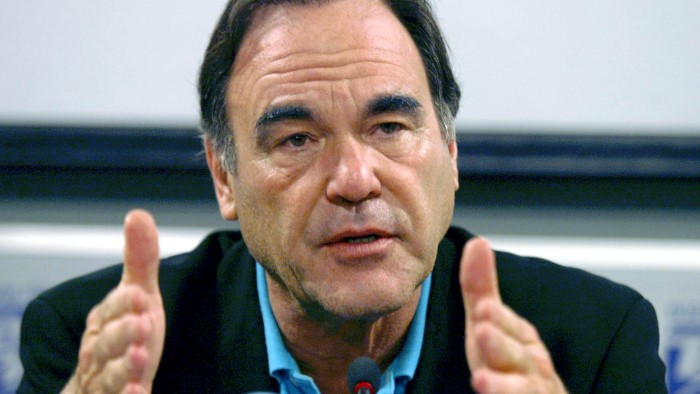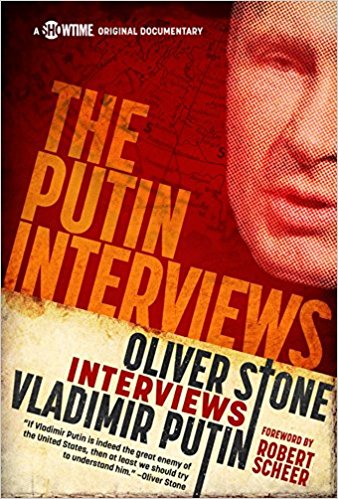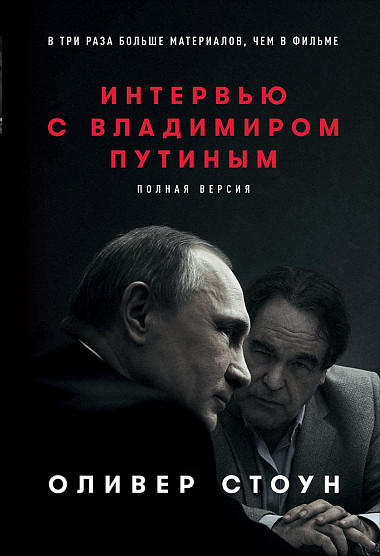Svetlana Smetanina
Two years of work, 20 hours of interviews, four episodes of the documentary – and now yet the issue of The Putin Interviews that acclaimed director Oliver Stone presented at the International Book Fair Non/fiction№19. Filmmaker believes in the importance of conveying the Russian president's views to the Western society, where the situation on matters relating to the freedom of expression reminds him Soviet newspaper Pravda from Soviet times.

At first Alpina Publishing house has been planning to organize the meeting with readers in a small area for workshops. But the book publisher quickly changed the mind and moved the Q&A to the Central House of Artists' Great Concert hall where the Book Fair was held. It was the right decision: not only all the seats but also aisles in the hall were packed. The first question sounded more like a panegyric, the director's fan wished him to receive a Russian analogue of the Pulitzer Prize. An iconic movie director and triple Oscar winner has responded negatively, explaining that in his view the results of this award have long been rigged, and the prize is exclusively given to corporate mass media for their narrow viewpoints. Its one-sidedness, partly switching into hate, has become one of the powerful reasons to produce film-interview with Russian President.
“I can't describe what a horrible image of Vladimir Putin was created in the West by mass media. He is condemned in murdering his political opponents, he is blamed for being the wealthiest person on Earth. Being the Vietnam War veteran, as me, Senator McCain labelled Vladimir Putin a “murderer” two times. After that, I can't call McCain a very smart man. I have to mention that this negative image began to emerge after the Munich speech in 2007 and was getting worse year by year. I even can't describe how dangerous it is. Recalling myself as a young man during the Cold War, people could hate Khrushchev but they have never crossed the line with personal insults. In this particular case we can observe the personal hatred,” Stone underlined.
Director calls himself “a warrior against all injustices in the world” and records that the happiest year for him was 1989, when the Berlin Wall fell down. According to Stone, it was the world's heyday when everybody believed that the Cold War is finished, and those trillions of dollars US would spend on the arms race could be used for economy developing. But it never happened. “And next 20 years have become a great source of disappointment. Especially last few years, they were really terrible.“ - admitted filmmaker.
alpinabook.ru
Interestingly, the idea to record interview with Putin was pretty spontaneous, and it was provoked by Edward Snowden. Oliver Stone was making a documentary on the American defector mainly in Germany, and the last scenes were shot in Moscow. Then the idea has emerged.
“It happened so that I met Putin at a reception after one theater play on 1960s. I've been cooped up at this staging for several hours, not understanding a word. But afterwards the president has generously took his time and shared his version of this story. And then the idea to continue the interview has emerged. After we were done with Snowden story, we immediately came to the Kremlin bringing all our equipment. We were shooting for 2-3 days every day. And all that despite very complicated schedule of the president. Sometimes the shootings were scheduled for 6pm, but we could begin only at 11 pm. No matter how late it was Putin was always ready for 2-3 hours of interview. Tremendous discipline,” recounts the director.
Actually, Putin's self-discipline and self-control are among the most powerful impressions of the filmmaker. “He selects words very carefully. It is rare when the person doesn't make mistakes through 20-hour interview. Putin is very reserved and patient, he's an excellent speaker, he's very rational. His detailed answers are always to the point. Putin has an outstanding and self-controlling mind. He is much more conservative than me, but I admire it. I admire his self-discipline that probably comes from judo and from those 16 years he's spend communication with world leaders. I don't know if he plays chess but I cannot but notice his strategic thinking. He considers consequences of both words and deeds.”

By the way, this modesty of Putin has almost put the brakes on the interview. Coming to US after 3 shooting days and sift through the footage Stone had a doubt that Americans would be engaged. Russian President was too reserved, too self-controlled, too knowledgeable. For example, he could talk on economics for hours like giving a lecture to students.
And yet, it continued. American film crew came to Moscow in February 2016, then in May. “And then we were sure – that's all,” recalls Stone. “But then Trump won the elections, and we came back again. And Putin told us that it is difficult for any US President to change the country politics that is carved in stone since 1917. And this politics isn't really so much anti-communist as anti-Russian.”
Oliver Stone's film is the answer to continuing Russophobiс hysteria on the West. Now the book includes three times more content. “People on the West simply don't know about many things Putin talks about in this documentary. Western world doesn't know about things that he says about Ukraine from Russian perspective. These words are not heard, they are immediately rejected and marked as propaganda. For me it is important that these statements are heard. It is important that the West again and again learns about Russian position – regarding NATO, US withdrawal from the Anti-Ballistic Missile Treaty, American support of terrorism in the Caucasus. These questions are not discussed there, nobody wants to hear about them.” - explains his position Oliver Stone.
In fact, the director believes that he made a very important step in his life meeting with Russian president and demonstrating his point of view on the West. Answering to the question if there were preliminary agreements on topics, Mr Stone responded that he has shared general ideas on the piece of paper although during the interview he would often jump to other topics. “If I would suspect that the president tries to deceive me, to pull the wool over my eyes, I would not continue,” underlined Stone.
At the end of interview he asks Vladimir Putin, in his opinion, one of the most important questions: “I've drew parallel with Roosevelt who stayed four consecutive presidential terms, with Castro, with Stalin, and asked clear question: what is the price of the power? And when you realize that you're not wanted, now needed anymore. It is a burning question, it needs continuous self-evaluation, self-awareness.” The answer to this question Oliver Stone advises to search in his book.










